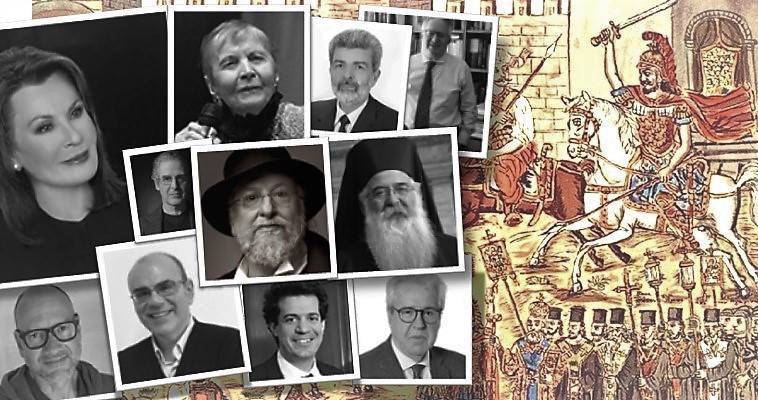Vlassis Agtzidis: Can there be an 1821 without 1453? – Not a word from the 2021 bicentennial celebration Committee on the Fall of Constantinople
09/06/2020
By Dr Vlassis Agtzidis
One would expect an announcement on the Fall of Constantinople from the, otherwise, very verbose government committee for the celebrations of the 200th bicentennial of the Revolution of 1821. The occasion was not insignificant! Both because without the Fall of 1453 there would be no need for revolution in 1821, and because in addition to the significance of the historical event, there was this offensive, for modern Greeks – necessarily the unique descendants of the Byzantine Romans -, of the use of the Fall by Erdogan’s Islamist nationalists.
Of course, the event did not favor an approach like the ones that the Commission had become accustomed to, either when it characterized Greece’s first Governor Kapodistrias as a dictator, or by highlighting General Karaiskakis as a very notable male chauvinist of his time. And maybe because the fact of the Fall did not favor such an approach, perhaps that is why there was silence. But let’s see how these two dates relate to an indestructible bond.
The Fall of Constantinople to the Ottomans in 1453 finally closed a great historical period that began with its foundation by Constantine the Great and was characterized by the gradual Hellenization of the eastern Roman Empire. The Fall of the City in 1453 and a little later the occupation of Patras (1458), Mistras (1460), and the overthrow of the Trabzon Empire in the Asia Minor Black Sea coast (1461), confirmed the final dominance of another cultural model born centuries ago. in the deserts of Arabia: of Islam.
This new situation contributed to the cessation of the process of the rebirth of letters through the birth of modern Hellenism in the 13th century and the emergence of early theories that we will encounter again with the emergence of the European Enlightenment. To understand the beginning of Greek ethnogenesis in the 13th century, it is enough to look at an answer from Ioannis Vatatzis, emperor of Nicaea in Bithynia after 1204, to Pope Gregory. In this answer he expounded on, in the most official manner what Constantine the Great bequeathed to the “race of the Greeks” the Roman Empire.
Vatatzis uses the term “race (genos)” instead of the modern term “nation” , and not in order to represent a religious group: “You write in your letter that within our Greek race wisdom reigns; and the kingdom in this world was bequeathed to our race by Constantine the Great. Is there anyone who is unaware that the legacy of his own succession has passed into our own race and we are his heirs and successors?
The echo will remain alive
Consequently, anyone who interrupts developments in the Greek world after the French Revolution, ignoring the ideological legacy of Modern Hellenism, commits a great slight. Because in addition to the culmination of that spirit and rebirth that took place in Nicaea in the 13th century, it continued in Mystras, Trabzon and Constantinople until their complete domination by Ottoman Islam. That repercussion will remain alive in the Diaspora after the Fall and will fertilize the revolutionary spirit, once the appropriate conditions had been created after 1789.
The Revolution of 1821 was not a local event, but an issue of global significance. There was an early national revolution, based on existing social discrimination and against Islamic domination in the East, inspired by the French model. It was a revolution that was born on February 22, 1821, when Alexandros Ypsilantis crossed the Prut river, raised the flag of the Revolution and two days later issued the proclamation-call “Fight for faith and homeland”. This was the event that sparked the Greek uprisings in various parts of the Ottoman Empire, the most successful of which was that of Moreas.
Here is how revolutionary general Theodoros Kolokotronis perceived this continuity between 1453 and 1821, which the members of the government “Committee for 1821” seem to be unaware of: “When we took Nafplio, Hamilton came to see me. He told me: “Greeks must ask for a compromise, and England must mediate.” I replied, “This can never happen, freedom or death. We, Captain Hamilton, have never compromised with the Turks.” Our king was killed, we did not make any treaties, his guard was always at war with the Turks and two fortresses were always defiant.” He said to me: “What is his royal guard, what are the fortresses?” “Our king’s guard is the so-called Klefts, the fortresses are Mani and Souli and the mountains.” That’s how he came to never speak to me again ” (Apanda Tsertseti, vol. III, pp. 149-150).
In conclusion, it seems that for the Commission, under Ms. Angelopoulou, 1821 is a milestone in a historical vacuum. I can’t assume anything different, since no announcement was made about the anniversary, an anniversary that gained heightened salience due to Erdogan’s Islamo-nationalist fiesta around the Hagia Sophia Cathedral. In conclusion, the Greek Neo-liberal Right is imbued with some peculiar quirks as concerns its historic and social preferences.





